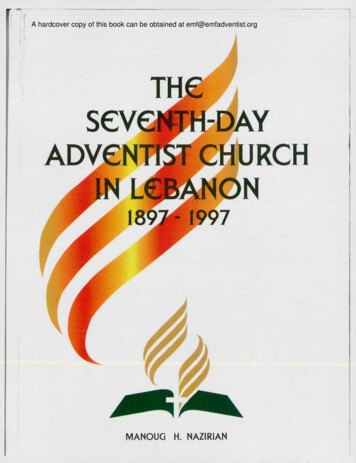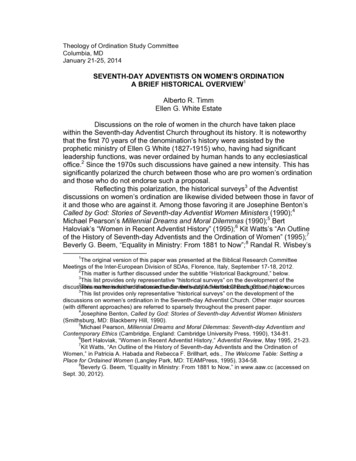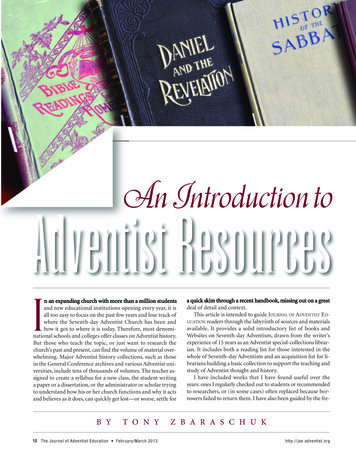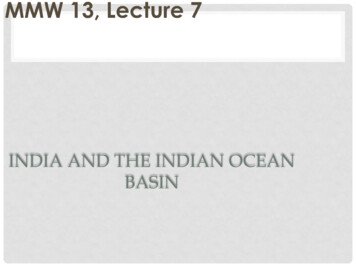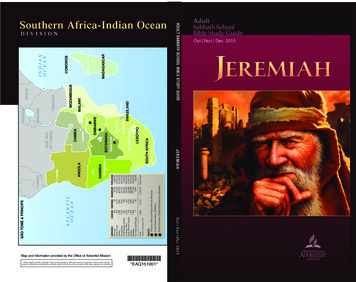
Transcription
3,038,000188,000Lower Gweru Clinic, ZimbabweSolusi University Dining Hall Extension, Zimbabwe33,170,678 176,267,000213,1579,461Gateway Adventist Primary School, istics as of First Quarter 8242,446944,898772,5604,991Pretoria3SOUTH BURUNDIUGANDAZIMBABWELusakaZAMBIADEM. REP.OF CONGOCape TownNAMIBIAWindhoekANGOLALuandaCONGOCHURCHES COMPANIES MEMBERSHIP POPULATIONATLANTICOCEANBotswanaIndian OceanMalawiMozambiqueNorth-Eastern AngolaSouthern AfricaSouth-Western AngolaZambiaZimbabweSao Tome and Principen*EAQ151001*nWhere legally possible, offerings will go to these projects; otherwise special arrangement will be made with theGeneral Conference for distribution of funds based on the laws of the countries where these offerings are collected.Oct Nov Dec 2015Map and information provided by the Office of Adventist MissionJEREMIAHSÃO TOMÉ & ivisionADULT SABBATH SCHOOL BIBLE STUDY GUIDESouthern Africa-Indian Ocean
Contents1The Prophetic Calling of Jeremiah—September 26–October 22The Crisis (Within and Without)—October 3–9143The Last Five Kings of Judah—October 10–16224Rebuke and Retribution—October 17–23305More Woes for the Prophet—October 24–30386Symbolic Acts—October 31–November 6467The Crisis Continues—November 7–13568Josiah’s Reforms—November 14–20649Jeremiah’s Yoke—November 21–277210The Destruction of Jerusalem—November 28–December 48011The Covenant—December 5–118812Back to Egypt—December 12–189613Lessons From Jeremiah—December 19–25610412501 Old Columbia Pike, Silver Spring, MD 20904Come visit us at our Web site: http://www.absg.adventist.orgEditorial OfficePrincipal ContributorImre TokicsEditorClifford R. GoldsteinAssociate EditorSoraya HomayouniPublication ManagerLea Alexander GreveEditorial AssistantSharon Thomas-CrewsPacific Press CoordinatorWendy MarcumArt Director and IllustratorLars JustinenDesignJustinen Creative Group 2015 General Conference of Seventh-day Adventists . All rights reserved. No part of the AdultSabbath School Bible Study Guide may be edited, altered, modified, adapted, translated, reproduced, or published by any person or entity without prior written authorization from the General Conference of Seventh-day Adventists . The division offices of the General Conference ofSeventh-day Adventists are authorized to arrange for translation of the Adult Sabbath SchoolBible Study Guide, under specific guidelines. Copyright of such translations and their publicationshall remain with the General Conference. “Seventh-day Adventist,” “Adventist,” and the flamelogo are registered trademarks of the General Conference of Seventh-day Adventists and maynot be used without prior authorization from the General Conference. Cover and interior images 2015 Lars Justinen and GoodSalt Inc. All rights reserved.1
Mi-YittanBiblical Hebrew, like most languages, is sprinkled with idioms, words,or phrases that mean something different from what they immediately say. An example is mi-yittan, which is composed of two Hebrewwords: mi, which is the interrogative “who?”; and yittan, which means “will give.”Thus, we have “who will give?”In the Hebrew Bible, this phrase expresses the idea of a wish, of a desire, of someonewanting something badly. For instance, after their escape from Egypt, the childrenof Israel, facing challenges in the wilderness, exclaimed, “ ‘If only we had died by theLord’s hand in Egypt!’ ” (Exod. 16:3, NIV). The phrase “if only” came from mi-yittan.In Psalm 14:7, David utters, “Oh that the salvation of Israel were come out of Zion!”The Hebrew doesn’t say, “Oh”; it says, mi-yittan. In Job 6:8, when Job exclaims, “ ‘Oh,that I might have my request’ ” (NIV), “Oh” is from mi-yittan.Another occurrence appears, this time in Deuteronomy 5:29. Going over the historyof God’s providences, Moses reminds the children of Israel about their request that he,Moses, talk to the Lord for them, lest they die. According to Moses, the Lord, pleasedwith their request, then said: “Oh, that they had such a heart in them that they wouldhear Me and always keep all My commandments” (NKJV).The word translated “Oh”? Yes, it is mi-yittan.Incredible! Here is the Lord—the Creator God, the One who made space, time,and matter, the One who spoke our world into existence, the One who breathed into2
Adam the breath of life—uttering a phrase generally associated with the weaknessesand limitations of humanity.Talk about the reality of free will. Talk about the limits of what God can do inthe midst of the great controversy. This use of mi-yittan reveals that even God won’ttrample on free will (because the moment He did, itwould no longer be free).Now, if ever one book of the Old Testament revealed The book of Jeremiahthe reality of God’s desire for humans to obey Him, recounts the ministryand the human tendency not to, it would be the book and message of theof Jeremiah, the topic of this quarter. Set against theprophet as he, withbackground of great geopolitical changes in the ancientNear East, the book of Jeremiah recounts the ministry passion and faithfuland message of the prophet as he, with passion and ness, preached God’sfaithfulness, preached God’s message to a people who, message to a peoplefor the most part, didn’t want to hear it.who, for the mostStarting with the prophet’s call, the book takes uspart, didn’t want tothrough decades of biblical history as the Lord used thisyoung (and then old) man to proclaim the basic truths hear it.that have been the foundation of the biblical messagefrom the beginning. And of all the spiritual truths taught in the book, these wordscatch the essence of so much of what the Lord seeks from His people: “Thus says theLord: ‘Let not the wise man boast in his wisdom, let not the mighty man boast in hismight, let not the rich man boast in his riches, but let him who boasts boast in this,that he understands and knows me, that I am the Lord who practices steadfast love,justice, and righteousness in the earth. For in these things I delight, declares the Lord’ ”(Jer. 9:23, 24, ESV).To read the book of Jeremiah is to take a journey, a spiritual journey that goes backand forth from the lowest depths of human depravity to the heights and grandeur andmajesty of the Lord—the Lord who, from those heights, cries out to all of us: Mi-yittanthat such a heart would be in you!Imre Tokics, PhD, is the head of the Old Testament Department at the AdventistTheological College, Pecel, Hungary. He is a professor of Old Testament and Jewish religious sciences, and also has a doctor of law (LLD) degree.3
“Believe in the Lord your God, and you will be established; believe his prophets, and you will succeed.”2 Chronicles 20:20, ESVA five-year journey through Scripture andthe Spirit of ProphecyBelieve His Prophets, a sequel to Revived by His Word, is a five-yearjourney through the Bible and selected writings of Ellen White. Thisjourney includes daily Bible readings, daily interactive blogs, andweekly selections from the Spirit of Prophecy. Participants will readthrough the entire Bible, Steps to Christ, Christ’s Object Lessons,Patriarchs and Prophets, Prophets and Kings, The Desire of Ages,The Acts of the Apostles, and The Great Controversy. Join this life-changing journey.Discover divine insights in the inspired writings.Explore His prophetic Word like never before.Invite your Sabbath School to participate.Join with the thousands of believers who have signed up at:www.BelieveHisProphets.org.Follow us on Twitter @Revive Reform.evival
P U T THE SPOTLIGHTB ACK O N MI S S I O N W I THMission Spotlight!Produced each quarter by the Office ofAdventist Mission, this DVD is a completepackage—featuringaction-packed missionstories from aroundthe globe, includingThirteenth SabbathMission Offeringprojects. Available inshort weekly or longermonthly segments.Mi s s i on Sp otlight is great for Sabbath SchoolChildren’s storiesBefore churchSchool and family worshipsPathfindersPrayer meetingsAnd more!Cost is Absolutely Free! The DVDs are sent to everychurch in the North American Division.DOWNLOAD OR STREAM STORIES FROM WWW.MISSIONSPOTLIGHT.ORG.15-4-ABSG MS Ad BW.indd 11/29/15 5:01 PM
L esson1*September 26–October 2The Prophetic Callingof JeremiahSabbath AfternoonRead for This Week’s Study: Isa. 1:19, Jer. 7:5–7, 1 Kings2:26, Jer. 1:1–5, Isa. 6:5, Jer. 1:6–19, Matt. 28:20.Memory Text: “Before I formed you in the womb I knew you; beforeyou were born I sanctified you; I ordained you a prophet to thenations” (Jeremiah 1:5, NKJV).We know more about the life of Jeremiah than we do aboutany other Old Testament prophet. The biographical facts inhis book help us understand better his work as a prophet.Jeremiah had such an effect on history that, even at the time of Jesus,he was a revered prophetic figure.At the same time, the prophet’s work, judged by human standards,shows only slight success. Despite decades of fervent warning andpleadings, the people for the most part didn’t listen to the messages hegave them from the Lord.Nevertheless, despite the opposition, Jeremiah could not be boughtor sold; he stood as “a fortified city, an iron pillar and a bronze wall”(Jer. 1:18, NIV), not in his own strength but in the Lord’s.Jeremiah’s lot in life wasn’t a happy one in many ways. His callingbrought him suffering, woe, rejection, even imprisonment. Worse stillwas the fact that so many of these troubles came from the very oneswhom he was seeking to help, seeking to point in the right direction.Thus, in his own way, Jeremiah prefigured what Jesus Himself wouldface hundreds of years later in the same land.* Study this week’s lesson to prepare for Sabbath, October 3.6
S unday September 27The ProphetsThe prophets, according to their calling, were determined protectorsof God’s law. They stood on the ground of the covenant and the TenCommandments (Jer. 11:2–6). Micah 3:8 gives one summary of theprophets’ work, which was “to declare unto Jacob his transgression,and to Israel his sin.” And the concept of sin, of course, is meaninglessapart from the law (see Rom. 7:7).What was the prophets’ message to the people? In what ways is thatmessage the same to us today? Isa. 1:19, Jer. 7:5–7, Ezek. 18:23. (Seealso Matt. 3:7–11.)God’s judgment was not inevitable, but it would come if the peopledid not turn from their evil ways. Change, however, is not so easy, especially when people get accustomed to doing evil. Who hasn’t seen howpeople get used to the evil that, at one time, had appalled them? Themessage of the prophets was to let people see just how bad their evilwas and what the consequences were of not turning away from it. Thismessage, of course, wasn’t the prophets’; it was the Lord’s.The prophets do not mention how God’s Word was revealed to themor how they heard it. At times God spoke to them directly; other timesthe Holy Spirit touched them in dreams or visions or, perhaps, througha “still small voice” (1 Kings 19:12). However their messages cameto them, the prophets had a mission, not only to transmit God’s willto the common people but also, if need be, to deliver it before kings,emperors, and generals.This task involved great responsibility: if they told the truth, thesepowerful people could kill them; but if they did not represent the truth,God’s judgment could also come upon them. To be a prophet is a heavycalling, and from what we can tell from the Bible, those given that calltook it seriously.We can be glad they did, for their messages have come down to us inthe Bible. In that sense, their words still speak, even today. The questionnow, as in Jeremiah’s time, is the same: Will we listen?What are the prophets, even after all this time, still telling us? Atthe core, what is their basic message to God’s people?7
M onday September 28Jeremiah’s Family BackgroundRead 1 Kings 1 and 1 Kings 2:26. What was the background that ledto the exile of Abiathar to his home in Anathoth?After he strengthened his throne, Solomon, in a conflict withAdonijah over succession, removed Abiathar the priest from hisoffice and sent him into exile back to his hometown, Anathoth,believed to be about three miles northeast of Jerusalem. Hilkiah,Jeremiah’s father, was a member of a priestly family that lived atAnathoth. Some have speculated that Jeremiah’s family may havedescended from Abiathar. Either way, we know from Jeremiah1:1 that the prophet had an exalted lineage. Thus, we can see herethat all through prophetic history the Lord has called all types ofpeople—shepherds, rabbis, fishermen, priests—to the propheticoffice.“A member of the Levitical priesthood, Jeremiah had been trainedfrom childhood for holy service. In those happy years of preparation he little realized that he had been ordained from birth to be ‘aprophet unto the nations;’ and when the divine call came, he wasoverwhelmed with a sense of his unworthiness. ‘Ah, Lord God!’ heexclaimed, ‘behold, I cannot speak: for I am a child.’ Jeremiah 1:5,6.”—Ellen G. White, Prophets and Kings, p. 407.The priests were to be the moral and spiritual leaders of thenation; they had been given important roles that impacted mostevery area of the nation’s spiritual life. Some had been faithful tothat task; others abused and violated it in ways that we can’t imagine. As we will soon read in the book of Jeremiah, the prophet hadvery strong words to speak against these unfaithful priests, who hadproved unworthy of the responsibilities and calling that they hadbeen entrusted with.What are your spiritual responsibilities, whether at home or inthe church or both or anywhere else? If a prophet were to speakto you now about those responsibilities, what might he or she say?8
T uesday September 29The Prophetic Calling of JeremiahRead Jeremiah 1:1–5. What does this tell us about Jeremiah’s calling?Just like other prophets in the Old Testament (and like Paul in theNew; see Gal. 1:1, Rom. 1:1), Jeremiah didn’t waffle in regard to whocalled him. He was very clear in these verses and, in fact, all throughthe book of Jeremiah, that what he was speaking was “the word of theLord,” which had come to him. No doubt this fervent conviction iswhat enabled him to press on ahead despite vehement opposition andtoil, suffering, and trials.Jeremiah’s calling happened in the thirteenth year of the reign ofJosiah, dated to about 627 or 626 b.c. We do not know the exact year theprophet was born, or the exact age he began his ministry. In his mind,though, as we will see, he deemed himself a child, someone too youngfor the task given him.Read Jeremiah 1:4, 5. What assurance and comfort should he havegotten from those words?God chose Jeremiah to be a prophet before his birth. God set himaside from the moment of his conception for this prophetic role. Thewords translated “I sanctified you” (vs. 5, NKJV) come from a verb thatmeans “to be hallowed,” “to be holy,” and to “sanctify,” among otherthings. It definitely has a sacred and religious connotation to it, one tiedalso with the sanctuary service itself. Indeed, the word for “sanctuary”comes from the same root word. The idea contained in it is that something or someone is “set apart for a holy purpose.” This is what God hadplanned for Jeremiah, even before his birth. These texts don’t teach preexistence or predestination; they teach, instead, God’s foreknowledge.God knows the end from the beginning. What comfort can wedraw from this amid the trials that we inevitably face?9
W ednesday September 30Reluctant ProphetsDespite the Lord’s assurance that Jeremiah had been divinely chosenfor this task, the young man was frightened and didn’t feel up to it.Perhaps knowing the spiritual state of people at the time, which wasn’tgood, and knowing what needed to be done, Jeremiah didn’t want thejob.Compare Jeremiah 1:6 with Isaiah 6:5 and Exodus 4:10–15. Whatcommon points do all these incidents have?None of those men, for whatever reasons, felt up to the task.Perhaps that was a crucial prerequisite for the job of a prophet: asense of one’s own unworthiness and inability for such a crucial andimportant task. A spokesman for the Creator? No wonder they allshrank from the task, at least at first.Notice Jeremiah’s first response after being called. He immediately talked about his inability to speak well, as did Moses. Isaiah,too, in his response, made mention of his mouth, his lips. In allcases, they knew that, whatever else their calling involved, it wouldinvolve speaking and communication. They were going to get messages from God and, as such, would be responsible for proclaimingthose messages to others. Unlike today, where they could build aWeb site or send a text message, this communication would so oftenhave to be face to face. Imagine having to stand before hostile leaders or unruly people and give them sharp words of rebuke and warning. The reluctance of these soon-to-be prophets is understandable.Read Jeremiah 1:7–10. What is God’s response to Jeremiah?Why should that response hold some hope and promise for usin whatever we believe we have been called by God to do?10
T hursday October 1The Almond BranchThe prophet is God’s witness; his job is to speak not for himself butfor God alone. Jeremiah wasn’t called to find solutions to the problemsof the nation or to become a great personality or charismatic leaderwhom the people would follow. Jeremiah had the singular mission totransmit the words of God to the people and their leaders. The emphasis here is not on the human or on human potential; it is on God’ssovereignty and power alone. The prophet was to point the people tothe Lord, in whom alone was the solution to all their problems. It is, ofcourse, no different for us today.What was Jeremiah’s first vision about? (See Jer. 1:11–19.)Most Bible translations translate the Hebrew expression in verse 11as “the branch of an almond tree.” These translations, however, miss theHebrew play on words here. The word translated “almond tree” has thesame root as the verb “to keep watch,” which appears in verse 12, whenthe Lord says that He is going to “keep watch” over His word to fulfill it.One could argue that the central message of the entire book ofJeremiah is found in verses 11 and 12. God’s word will be fulfilled. Oneday everyone will see events happen just as God said they would. Godwants His people to turn away from their sins. He has offered grace andforgiveness, but He does not force anyone to obey and be healed. If Hispeople will not respond to Him, His words of judgment and punishmentwill certainly be fulfilled as His words against Israel were fulfilled inthe book of Jeremiah.As we can see, too, God’s words here were not just for the people.The Lord was speaking directly to Jeremiah himself, warning him tobe prepared for the opposition that he would face. No matter whathappened, Jeremiah could have the assurance from God that “I amwith you.” He would, as we will see, need it.Don’t we all?Read Matthew 28:20. What assurance can we find for ourselvesin these words to us, living in the time that we do?11
F riday October 2Further Thought: Martin Luther wrote about the prophet in the intro-duction of his commentary to the book of Jeremiah: “Jeremiah was a sadprophet, who lived in a deplorable and difficult period and, what is more,his prophetic service was extremely difficult as he was struggling andfighting with a bad-tempered and stubborn people. Apparently he did notachieve much success because he experienced how his enemies becamemore and more evil. They tried to kill the prophet several times. Theypressed hard against him, whipping him several times. Yet, he would liveto see with his own eyes how his country was devastated and his peopletaken into exile.”“For forty years Jeremiah was to stand before the nation as a witnessfor truth and righteousness. In a time of unparalleled apostasy he wasto exemplify in life and character the worship of the only true God.During the terrible sieges of Jerusalem he was to be the mouthpieceof Jehovah. He was to predict the downfall of the house of David andthe destruction of the beautiful temple built by Solomon. And whenimprisoned because of his fearless utterances, he was still to speakplainly against sin in high places. Despised, hated, rejected of men, hewas finally to witness the literal fulfillment of his own prophecies ofimpending doom, and share in the sorrow and woe that should followthe destruction of the fated city.”—Ellen G. White, Prophets and Kings,p. 408.Discussion Question: One of the saddest things, and yet something that should giveus all, today, as Seventh-day Adventists, something to think about,is the fact that God had warned Jeremiah that he would face greatopposition from his own people. Read Jeremiah 1:17–19 again.Who would be the ones fighting against him? What fearful lesson should we take away from this for ourselves? That is, what isour attitude toward the prophetic word to us, especially when wehear things that we don’t like? How does the Ellen G. White quoteabove help express the fearful truth that the very ones who shouldhave been revealing the true God to the world were the ones whowere, by reviling and attacking His spokesman, fighting againstHim? (See also Eccles. 1:9.)12
Storyi n s i d eA Most Satisfying Career: Part 1Harry and Alex* worked as security guards in Malawi. One night Alex toldHarry that he had an idea of how they could earn some extra money.“What’s that?” Harry asked, interested.“We could use our rifles in a little side business,” Alex said, lifting his gun.“Rich people have more than they need, and we need more than we get. We couldtake a little from them so we can have enough for ourselves.”Harry wasn’t sure; but eventually, he was convinced. The two broke into thehome of a wealthy family and stole cash and anything they could carry. A fewdays later, they robbed more homes. But one night they were caught. Sitting injail, Harry realized the seriousness of his crimes. The two men were sentenced toeight years of hard labor in separate maximum security prisons.Harry arrived at the prison determined to escape. His prison shirt wasimprinted with the length of his prison term. One day Harry bribed anotherprisoner to trade shirts.When he wore his new shirt with a sooner release date, he was assigned to alow-security job in the prison garden. Harry noticed that the armed guard watching them grew sleepy every afternoon. One day when the guard was yawning,Harry dropped his hoe and ran. Other prisoners started running too.The guards caught all the prisoners except Harry, who had hidden amongsome large stones. When it was dark, the guards gave up their search andreturned to the prison. Harry crawled out and escaped.Harry found a job; for 18 months, he worked hard and stayed out of trouble.Then one day when he came into the bus station, the police were waiting to takehim back to prison. He now had to serve ten years.When Harry was escorted to his cell, he was surprised to find that his cell matewas Alex, his former partner in crime.“Hey, I have an idea,” Alex said after Harry settled in.“What’s your idea?” Harry asked. And suddenly it was just like old times.The prison walls were made of mud bricks with a thick coating of cement overthem. Harry and Alex decided to dig a small tunnel to the outside. It took themonly three days to dig through the wall. The two waited until dark then crawledthrough the hole.Everything seemed quiet; but as they scrambled up the outside wall, a guardsaw them and shouted. The guards chased them, but Harry and Alex had a goodhead start.The two stopped a car on the road, made the driver get out, and took the car.They drove to the city and sold the car for parts. But someone became suspiciousand told the police. Alex escaped, but Harry was caught. This time he wassent to a small prison where he could be watched more closely. That decisionchanged his life.To be continued in next week’s Inside Story.* Alex is a pseudonym.Produced by the General Conference Office of Adventist Mission.Web site: www.AdventistMission.org13
L esson2*October 3–9The Crisis (Withinand Without)Sabbath AfternoonRead for This Week’s Study: Judg. 2:1–15; 1 Kings 12:26–31; 2 Chron. 33:9, 10; Jer. 2:1–28; 5:2, 3.Memory Text: “ ‘ “Israel was holiness to the Lord, the firstfruits ofHis increase. All that devour him will offend; disaster will come uponthem,” says the Lord’ ” (Jeremiah 2:3, NKJV).If we could pick one word to describe the human condition since theFall, it would be crisis, the extent of which can be best understoodby what it took to get us out of the crisis: the death of Jesus on thecross. The crisis must be pretty bad; after all, look at the extreme measures needed to solve it.All through the Bible, many stories took place against the backdropof one crisis or another. The situation during the time of Jeremiah andhis ministry was no different.God’s people faced many challenges, both from within and fromwithout. Unfortunately, despite the terrible military threat from foreignpowers, in many ways the greatest crisis came from within. “Within”meant not just a corrupt leadership and corrupt priesthood, which werebad enough, but “within” was in the sense of people whose hearts hadbeen so hardened and damaged by sin and apostasy that they refusedto heed the warnings that God was sending them, warnings that couldhave spared them from disaster.Sin is bad enough, but when you refuse to turn away from it—talkabout a crisis!* Study this week’s lesson to prepare for Sabbath, October 10.14
S unday October 4A Quick HistoryWhen the Israelites had finally entered the Promised Land, afteryears of wandering in the wilderness, it wasn’t long before troublesbegan. All it took was for a new generation to arise, one that didn’t“know the Lord” (Judg. 2:10), and a spiritual crisis started that, inmany ways, infected the nation all through its history. It’s a problemthat, indeed, has infected the Christian church as well.Read Judges 2:1–15. What caused the crisis, and how was it mademanifest?Verse 11 says: “Then the Israelites did evil in the eyes of the Lord”(NIV). Each generation, one after the other, moved one step fartherfrom God until the nation was doing exactly what the Lord had told itnot to do. Due to their sin, the Israelites faced one crisis after another,but even then the Lord had not given up on them. He sent them judges(Judg. 2:16) who delivered them from their immediate woes.After the era of the judges, the nation entered a time of relative peaceand prosperity under what has been called “the United Monarchy,” therule of Saul, David, and Solomon, which lasted about one hundredyears. Under David, then Solomon, it grew into a regional power.The “good” times, though, did not last. After the death of Solomon(about 931 b.c.), the nation split into two factions, Israel in the northand Judah in the south. Much of the blame can be placed on the misguided rule of Solomon, who, for all his wisdom, made numerous mistakes. “The tribes had long suffered grievous wrongs under the oppressive measures of their former ruler. The extravagance of Solomon’sreign during his apostasy had led him to tax the people heavily and torequire of them much menial service.”—Ellen G. White, Prophets andKings, pp. 88, 89. Things were never the same again for God’s chosennation. Everything the Lord had warned them not to do, they did, andthus, they reaped the doleful consequences.Think about the problem of the next generation not having thevalues and beliefs of the one before it. How have we, as a church,dealt with this issue? How can we learn to transmit our values tothose who follow us?15
M onday October 5The Two KingdomsAfter the division of the nation, things went from bad to worse. Inthe Northern Kingdom, King Jeroboam made some terrible spiritualchoices that had a long-lasting impact for evil.Read 1 Kings 12:26–31. What should this tell us about how immediatecircumstances can so blind our judgment?The king’s introduction of idolatrous worship helped set the nationon a disastrous course. “The apostasy introduced during Jeroboam’sreign became more and more marked, until finally it resulted in theutter ruin of the kingdom of Israel.”—Ellen G. White, Prophets andKings, p. 107. In 722 b.c., Shalmaneser, king of Assyria, put an end tothe country and deported its inhabitants to different parts of his empire(see 2 Kings 17:1–7). There was no turning back from this exile. For atime, Israel disappeared from history.Things weren’t as bad in the Southern Kingdom, at least not yet.But they weren’t great either, and, as with the Northern Kingdom,the Lord sought to spare these people from the calamity that theNorthern Kingdom faced, only now from the threat of the Babylonians.Unfortunately, with rare exceptions, Judah had a series of kings whocontinued to lead the nation into deeper apostasy.What do these verses say about the reign of some of Judah’s kings?2 Chron. 33:9, 10, 21–23; 2 Kings 24:8, 9, 18, 19.Despite all the terrible leadership, so many of the prophetic booksof the Bible, including Jeremiah, are the words of the prophets whomGod sent to His people in an attempt to turn them away from the sinand apostasy that was eating at the heart of the nation. The Lord wasnot going to give up on His people without giving them ample time andopportunity to turn from their evil ways and be spared the disaster thattheir sin would, inevitably, bring.It’s so hard to step out of your own culture and environment andlook at yourself objectively. In fact, it’s impossible. Why, then,must we constantly test our lives against the standard of theBible? What other standard do
Oct 01, 2015 · “Seventh-day Adventist,” “Adventist,” and the flame . Now, if ever one book of the Old Testament revealed . the reality of God’s desire for humans to obey Him, and the human tendency not to, it would be the book .

